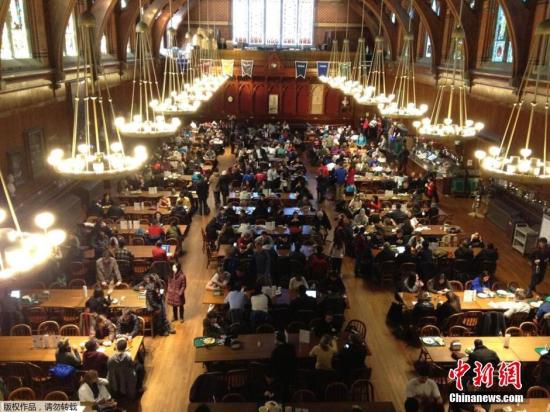China News Service, July 9th, comprehensive Chinese website reported that after Harvard University and Massachusetts Institute of Technology announced that they had filed a lawsuit on the new policy for international student visas, on July 8 local time, the University of Southern California, one of the universities with the largest number of international students in the United States, Also announced support for the lawsuit.
According to reports, UC President Carol Folt sent three tweets on the social networking site on the 8th to show support for the lawsuit and said that NU will also "actively consider all other legal options" and at the same time will Representatives of regional congresses and other legislative departments and personnel jointly deal with this very wrong decision."
Data map: Harvard University campus.
On July 8, local time, Harvard University and the Massachusetts Institute of Technology (MIT) said they had filed a lawsuit against the Trump administration's latest directive on foreign student visas.
According to the new regulations issued by the Immigration and Customs Enforcement Bureau (ICE) on the 6th, international students must attend face-to-face classes in order to retain their visas for international students. If their coursework is completely completed online, they will be deprived of the visa.
The report said that the measure announced by the White House on the 6th was seen as exerting pressure on universities to reopen their doors and abandon the more cautious measures recently announced by many universities to slow the spread of the new crown virus.
Lawrence S. Bacow, president of Harvard, said in a message to the university community: "This order was issued without prior notice." She said: "This seems to be intentional pressure on colleges and universities to require them Open the classroom in school this fall for face-to-face teaching without taking into account the health and safety of students, teachers and others."
This directive, which will be finalized later in July, may significantly reduce the number of international students enrolled in the fall. Advocates for immigration rights say that considering the delay in visa applications caused by the new crown epidemic, these new rules may discourage many overseas students from going to the United States to study at universities. Originally, these students would pay full tuition fees in the United States, which is an important source of income for many colleges and universities.
It is reported that many universities have taken measures to reduce contact, ranging from requiring masks in classrooms, to limiting social activities, and reducing the number of students returning to school due to concerns that the campus may become a new crown virus gathering area. Many universities also announced a combination of different teaching methods to provide some face-to-face courses, but there are also a large number of courses that must be completed online.
The report pointed out that these changes may make the visa for international students, namely the F-1 visa at risk under the new regulations. In the absence of face-to-face courses, if they are already in the United States, they will be required to return to their country. Those overseas students will not be allowed to enter the United States to take online courses.
Kenneth T. Cuccinelli, acting deputy minister of homeland security, said the government provides international students with greater flexibility than in the past. In the past, they had to keep their visas and could only take one online course; now, they can take more online courses as long as some of the courses they take are face-to-face.
Kuccinelli said: "If they are not going to be students or have 100% online lessons, then they don't make sense here. They should go home and wait until the school opens the campus and then come back."

